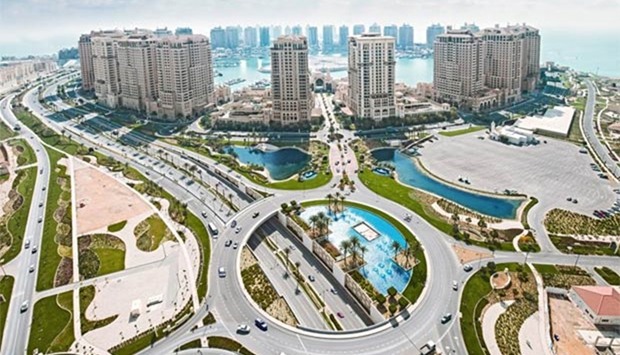Growth in Qatar’s expatriate population is predicted to rise in the second half of 2021, post lifting of social mobility restrictions, resulting in a pick-up in real estate demand, researcher ValuStrat has said in a report.
This, ValuStrat said, could head towards stabilisation of rents by the end of 2021.
Growing ownership by foreigners coupled with competitive listings for residential sales might slow down the rate of decline in capital values potentially bottoming out by the end of the year, ValuStrat said in its 2021 outlook.
Residential supply for 2021 is estimated at 8,200 units. Approximately 80% of the upcoming supply is concentrated in Lusail, The Pearl and West Bay.
The estimated mall supply for 2021 stood at 209,000 sqm gross leasable area (GLA), it said.
The Government of Qatar is encouraging retailers to shift to e-commerce platforms in order to capitalise on the growing trend of rising online transactions.
Rentals in malls and shopping centres will continue to soften due to pressures of online trading; however, demand is predicted to increase during H2, 2021, which may lead to softer declines in rents by the end of 2021.
According to ValuStrat, an estimated 880,000 sqm GLA of office space is predicted to be added during 2021. No major fiscal consolidations at private and government levels are expected to occur during 2021.
In addition, there is an expected increase in companies working in e-commerce, logistics, finance and technology.
Despite the influx of supply, the projected pick-up in market sentiment and demand might contribute towards slower pace in decline of office rents.
In hotels sector, Qatar is expected to receive 7,000 rooms (6,250 keys and 750 apartments) in 2021, the report said.
The lifting of quarantine measures expected in H2, 2021 might provide a boost to tourism. During H1, 2021 mandatory hotel quarantine and domestic tourism may provide support to hospitality industry, ValuStrat noted.
The Government of Qatar unveiled a budget of QR194.7bn for the fiscal year 2021 with a projected deficit of QR34.6bn (based on assumed oil price of $40 per barrel).
The budget is expected to support up-coming as well as on-going development projects in various sectors and those related to World Cup 2022, education and healthcare and infrastructure development in the economic, industrial and logistics zones.
This, ValuStrat said, could head towards stabilisation of rents by the end of 2021.
Growing ownership by foreigners coupled with competitive listings for residential sales might slow down the rate of decline in capital values potentially bottoming out by the end of the year, ValuStrat said in its 2021 outlook.
Residential supply for 2021 is estimated at 8,200 units. Approximately 80% of the upcoming supply is concentrated in Lusail, The Pearl and West Bay.
The estimated mall supply for 2021 stood at 209,000 sqm gross leasable area (GLA), it said.
The Government of Qatar is encouraging retailers to shift to e-commerce platforms in order to capitalise on the growing trend of rising online transactions.
Rentals in malls and shopping centres will continue to soften due to pressures of online trading; however, demand is predicted to increase during H2, 2021, which may lead to softer declines in rents by the end of 2021.
According to ValuStrat, an estimated 880,000 sqm GLA of office space is predicted to be added during 2021. No major fiscal consolidations at private and government levels are expected to occur during 2021.
In addition, there is an expected increase in companies working in e-commerce, logistics, finance and technology.
Despite the influx of supply, the projected pick-up in market sentiment and demand might contribute towards slower pace in decline of office rents.
In hotels sector, Qatar is expected to receive 7,000 rooms (6,250 keys and 750 apartments) in 2021, the report said.
The lifting of quarantine measures expected in H2, 2021 might provide a boost to tourism. During H1, 2021 mandatory hotel quarantine and domestic tourism may provide support to hospitality industry, ValuStrat noted.
The Government of Qatar unveiled a budget of QR194.7bn for the fiscal year 2021 with a projected deficit of QR34.6bn (based on assumed oil price of $40 per barrel).
The budget is expected to support up-coming as well as on-going development projects in various sectors and those related to World Cup 2022, education and healthcare and infrastructure development in the economic, industrial and logistics zones.


